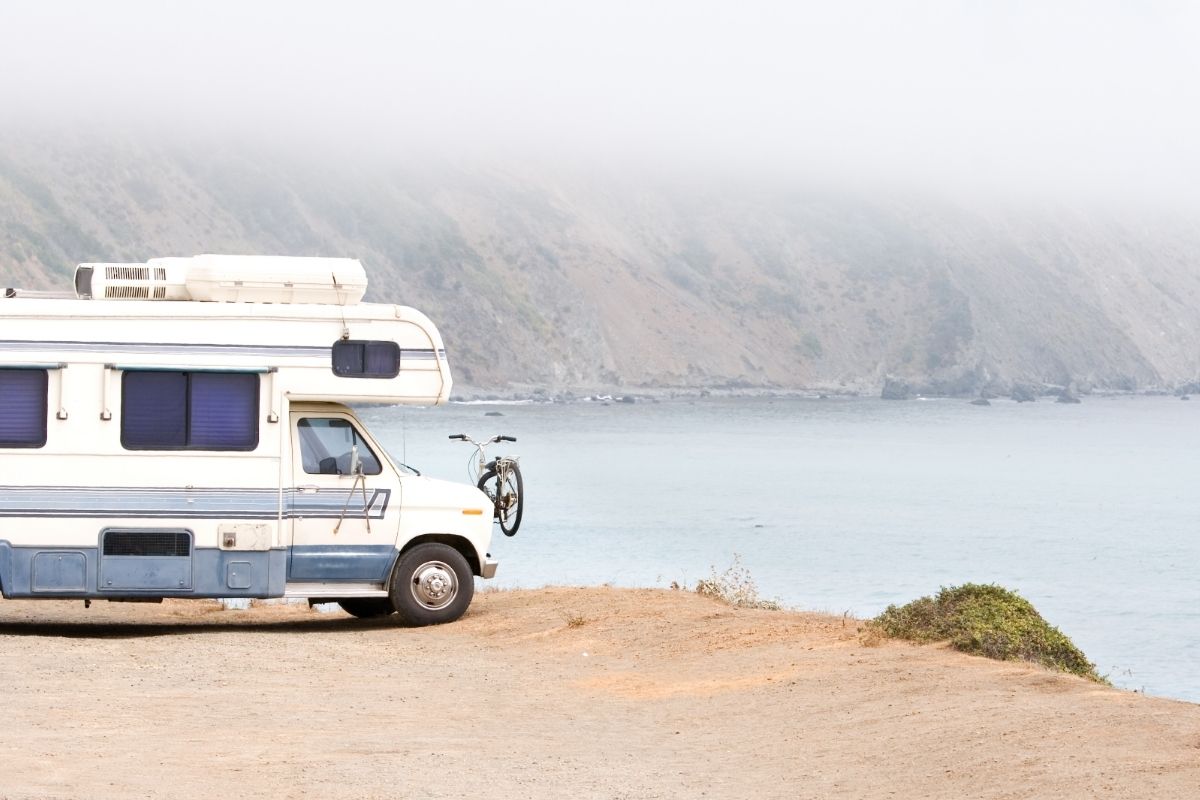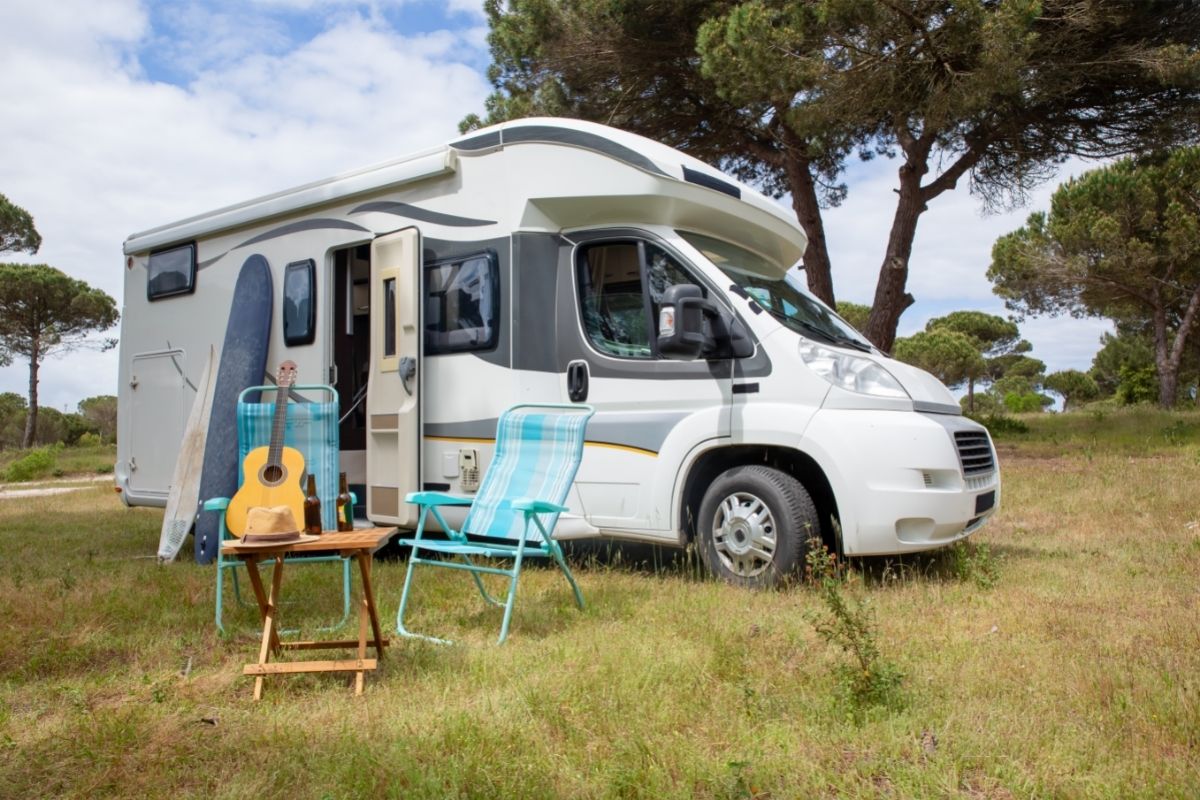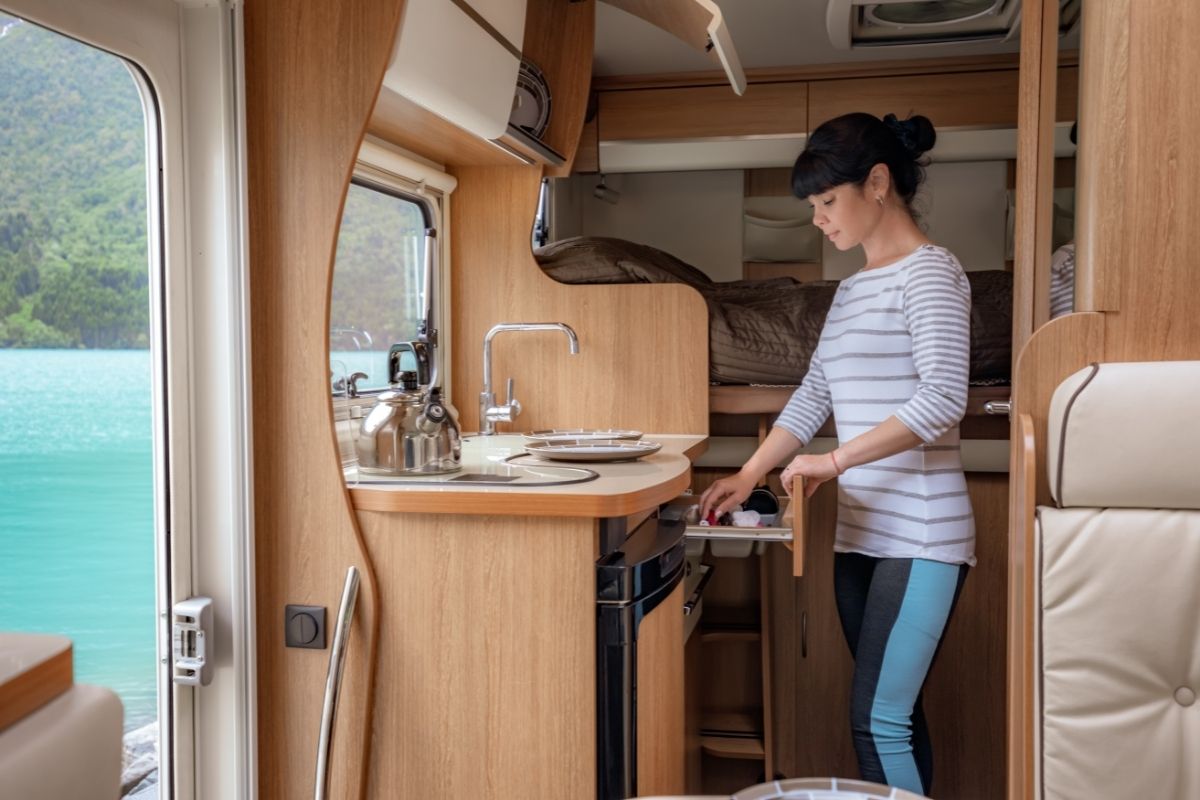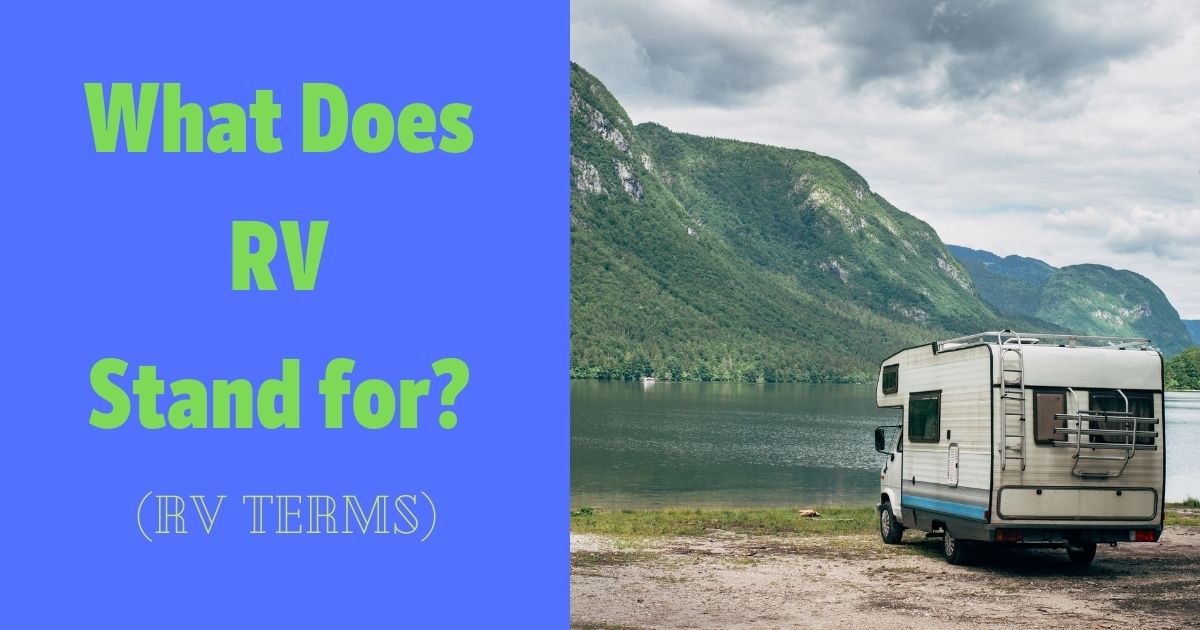The World of RVs
The abbreviation RV could mean many different things. So, in the context of this piece, what does RV stand for? You are in the right place to get answers to these questions and many others.
You can have the RV of your dreams as long as you can afford to buy and maintain it. However, you can also convert your current vehicle into an RV, as you will learn later in this excellent piece. Welcome to the world of RVs!

What Does RV Stand for?
A recreational vehicle, also known as an RV, is a van or truck with space for cooking and entertainment. These mobile homes provide the perfect environment to enjoy your favorite pastime: camping!
They also make great places to sleep when you’re out exploring nature because it gives us so much opportunity – especially during these long winter nights where you can hardly see any stars due to our city lights shining all over them.
What is an RV?
RV is an abbreviation for Recreational Vehicle. A recreational vehicle is a mobile home that’s big enough for people to live in while they’re on the move. They come with all sorts of amenities like cooking equipment and a space heater.
However, what makes them unique from tents or trailers is their ability (or lack thereof) when it comes down to how much privacy you’ll have at any given moment. Additionally, each model has some sort of window arrangement, so even though your view might be blocked by brush outside…you know someone could see right inside!
You can have an RV of just about any size, but one thing that will most likely prevent you from purchasing the largest and best one is cost. RVs are very expensive depending on the features they come with and how big or little they might be compared to other models out there right now.
The size of the RV you choose will determine its price because many manufacturers set a particular Manufacturer’s Recommended Retail Price (MSRP) on their vehicles. The MSRP is usually based on how many different groups of people can sleep in the RV at any given time.
You might find it hard to believe, but there are RVs worldwide that cost upwards of 3 million USD. On the other hand, you can find used RVs that cost as low as 1000 USD. Therefore, you must go for the RV that best suits your budget.
There are different classes of RVs. Here is a guide of different types and sizes of RVs to help you in selecting:
Motor Homes
Motor homes are regarded as some of the best recreational vehicles. They are best suited for long journeys, mainly because they offer the largest room and ultimately the most comfort. They also come with their own power source in the form of an engine.
This type of RV is fitted with other amenities such as a kitchen, bedroom, and bathroom. However, all these great features come at a cost. Motor homes RVs are the most expensive, with some costing over one million USD.
There are different classes of motor homes, including:
- Class A Motorhomes. These are the largest of all kinds of motorhomes. These RVs come fully fitted as if they were a real home. Moreover, they are spacious and luxurious, with massive storage opportunities.
- Class B Motorhomes. The Class B Motorhomes are usually referred to as camper vans. They are relatively smaller compared to their Class A counterparts. You can build this RV using a Ford Transit, Ram Promaster, and Mercedes Sprinter.
The main difference with Class A is their limited space. However, one thing that makes them a popular option for many is that some have four-wheel drive and offer excellent gas mileage.
- Class C Motorhomes. These RVs are usually built on a van or truck’s chassis designed for a motorhome. They also have an overhang area that sits above the cab of the truck or van, which acts as storage of sleeping area.
They also come with nearly similar amenities to those found in the Class A Motorhomes. Moreover, it offers a better fuel economy than the Class A Motorhomes. However, they are also too big to fit in an ordinary garage; hence you must consider where you’ll store them.
Travel Trailer
The travel trailer is arguably the most popular type of RV. Perhaps it is because it is available in many different sizes, styles, and types. This means that you could effortlessly find a travel trailer that fits your needs.
It is basically a compact home that you haul behind your vehicle. Therefore, before you purchase one, you need to consider the weight your car can tow without any challenges.
Truck Camper
A truck camper is simply a step down from the motorhome, which is larger. They don’t have their own means of power to move; hence they must be pulled by another vehicle. Moreover, the truck camper is large and heavy, meaning not all cars have the capacity to pull it. They come fitted with a bedroom, kitchen, and bathroom.

Fifth Wheel Travel Trailer
This RV comes with some amenities that allow you to shower, sleep, dine and cook. These RVs also have luxury versions that come with slide-outs that let the RV’s walls extend outward to three feet. What’s more, you can activate this outward movement by simply clicking a button.
Suppose you want to run an errand; you can effortlessly unhitch the truck from the Fifth Wheel. Finally, you need to ensure the vehicle you are using can handle the truck’s weight.
Pop-Up Camper
The Pop-Up Camper is regarded as the smallest RV in the market. As a result, they are relatively easier to tow. However, you will not enjoy some amenities available in regular campers and motorhomes. Studies have revealed that these RVs have become more prevalent in recent years as many people pick camping as a hobby.
Converting Cars Into RVs
Don’t panic if you want to take a road trip but don’t have the money for an RV! You can effortlessly turn your car into an RV. Even though your car might not offer the comfort of an RV, if you are on a budget, it is the best option at your disposal.
The big question is–how do you convert your vehicle into an RV? Well, here are critical steps you should follow to convert your car into an RV:
Assess Your Vehicle
The first thing you ought to consider is the type of vehicle you are working with. It will surprise you to know that you can turn your two-door vehicle into a comfy adventure rig. Therefore, the size of your current car should not discourage you.
Additionally, some benefits come with using a smaller vehicle. For example, you will enjoy better gas mileage. Typical RVs will get you around 13 miles (20.92 kilometers) per gallon, meaning you could use up your road trip budget on fuel.
Regardless of the type of car you are using, examine the space you have after laying down your back seats. If you have sufficient room for a person to lie horizontally, you can create a car camping rig that would include a bed.
Settle on the layout
After that, you need to decide on the layout of your RV. For instance, you can create a platform bed with storage beneath or use camping mattresses in the back to get a comfortable yet straightforward car camping unit.
Here are critical questions to ask yourself to help you decide:
“Do you require storage space inside your car?”
If your answer is yes, then ask yourself what you plan to store inside the area. However, remember that if you carry less stuff in your car, you will have sufficient room for yourself.
In this regard, consider using attachable rooftop storage boxes to help save space. Additionally, consider the activities you enjoy doing while camping to help guide you on the type of gear you will carry.
“How many people will sleep in the space?”
If you intend for more people to sleep in the space, you will need a bigger area. Other important questions you need to ask yourself include whether your furry friend will be joining you on the trip.
“How long will your trip last?”
The duration of your journey will inform you of the layout. For instance, if you spend a long time on your trip, you will need more creature comforts. On the other hand, a not-so-plush bed would be sufficient if it is just an occasional weekend getaway.
Additionally, if you need your car to run other errands like shuttling your kids to and from school, you will have to go for options that you can easily remove.
Build Your Platform
Once you settle on the layout, it is time to get down to business. In the phase of the process, carpentry experience will come in handy. It would help get a professional carpenter with the required expertise to help you if you don’t have any experience.
There are several platform designs that you can consider. It will only need you to spend some time on the internet to get inspiration on how your design will be.
Begin by measuring the interior length of your car’s space where you plan to fit your mattress. An essential tip would be to push the car seats forward to maximize the sleeping area. However, please don’t push it too forward that it would be uncomfortable to drive. Moreover, don’t measure until the end as you will need to close your trunk, right?
Before measuring the available height, consider what you will need for clearance. For instance, what structures do you need to clear? How much headroom do you require? The other question you need to consider is the type of storage bins you want beneath your platform. After that, you can measure the height. Once you have measured the available length, width and height, you are free to begin building.
What do RVs Come With?
RVs are perfect for those who want to have the best of both worlds. They provide a place not only for you but also for your belongings, be it pets or whatever else life brings!
A typical RV includes a kitchen, bathroom, and one or more sleeping quarters. RVs can range from basic (containing only those essential features) to the more luxurious with air conditioning (AC), water heater, etc.
Some luxury models may also have satellite receivers that provide access to TV channels for movies and other entertainment on the go without having an internet connection!
To accommodate the different needs of an RV, there are many options available. For example, a single deck which you can tow behind your car. On the other hand, the double decks can expand and contract to fit into smaller spaces without having too much extra weight on them or taking up more space when not in use, like larger RVs with removable roofs called “sun blinds.”

The Benefits of Living with an RV
There are many benefits associated with living with an RV, including:
It is More Economical
Going out on an adventure can be costly to pay for hotel rooms and other camping site facilities. However, if you go for an RV, you forego many additional costs associated with recreational activities.
It is also important to note that while certain camp grounds are available for free, some charge a nominal “standing charge” per day. The fee takes care of amenities and electricity. Nevertheless, some are boondocking, meaning you camp totally free! xx
It Allows You to Spend More Time in Nature
Nothing beats the great outdoors! Studies have confirmed that spending time in nature helps to boost your mood, making you feel more relaxed. This is one of the reasons many people enjoy RVing.
Moreover, the RV allows you to go boondocking or dry camping. This means you get to spend time off the grid while enjoying most of the comforts you would want at home.
Your Travel Is Not Limited
Don’t like your surrounding? Don’t worry! All you’ve got to do is pack up and leave! There are stories of families that have spent six months on the road, and in that period, they visited six states. They also enjoyed some really unbelievable scenery.
You Will Experience A Lot of Personal Growth
Living on the road demands a lot of responsibility. You probably know that life does not always go according to plan. In this sense, you will need to be flexible and figure things as you encounter them.
It Offers You The Chance to Meet New People
When RVing, there are plenty of new people you will come across during your trekking endeavors. For instance, you can meet other campers, campground hosts, kayakers, and fellow hikers, among others. In short, RVing allows you to meet many new people, and at the end of your trip, you will have made many new friends.
The Drawbacks of Living with an RV
Life on the road is not all rosy. As mentioned earlier, there are unpredictable things that could happen. Here are the cons of RVing:
RV Space is Relatively Limited
Your RV’s space is limited, meaning you might not carry as much stuff as you would like to. The RV does not give you room for extra clutter. Moreover, you will need to clean it often as it quickly gets cluttered. You will also have to make do with tiny showers and the absence of bathtubs.
You Will Have to Deal With Mold and Mildew
The limited space in your RV means that there is no proper ventilation. As a result, it creates a conducive environment for mold and mildew to grow. This is particularly true in areas that you cannot easily see.
Your RV Suffers Damages Each Time You Travel
Picture this; you are driving your home down the freeway at 60 miles (96.56 kilometers) per hour! Well, the only thing you can think of is things breaking. Moreover, there will be cracks and leaks on your RV. As a result, you must set aside a budget for repairs as they are guaranteed after spending some time traveling.
In this regard, it would help to inspect your rig before and after every drive. Inspect the corners and seams to ensure there are no water leakages and everything in its place.
Tips for New RVers
If you are new to RVing, specific tips will help you get started on the right note. Here are more critical points to remember:
- It is advisable to consider a diesel engine if your RV is more than 37 feet long (11.27 meters).
- If you are setting out for a long journey, ensure you plan your route and stop in advance.
- If you have issues reversing, please take some time to practice in an empty parking lot.
- High beams would not be ideal in a fog.
- Have a polarity tester and use it before you hook up your TV to external power supplies.
- Check your fuel levels at all times.
- Go for an aerodynamic RV to help save on fuel.
- Keep in mind the height and size of your RV to know where it will be safe for you to travel.
- Ensure you clean your RV well before after using it.
- Practice hitching and unhitching before going for your trip.
- Ensure you get a good size patio mat. It will come in handy when you are at a campground or RV resort.
- Please don’t overload your RV.
When Should you not Buy an RV?
It is not a secret that many people dream of owning an RV at some point in their lives for that dream road trip adventure. However, at times they don’t consider the negatives associated with owning an RV. Some people are anxious about driving large vehicles. If this is you, don’t buy an RV!
Apart from that, it would help if you considered the cost of purchasing an RV suitable for your needs. Moreover, you should look at the insurance costs that come along with it. Insurance companies usually charge extra for RVs than other vehicles. They argue that RVs cause more risk to the insurance company because many are fitted with things such as bathrooms and kitchens.
Additionally, an RV is just a house on wheels, and maintaining them can be costly depending on what you have fitted your RV with. Moreover, you also need to keep your RV in the best shape not to inconvenience you when you are out and about. So, if all these expenses will be too much for you, don’t buy an RV!
Finally, if you are not planning on living in your RV full-time, you will need a place to store it. In this regard, storage facilities are usually costly depending on your RVs size. So, you might want to ensure you can afford your RVs storage.
What is the Difference Between A Trailer and an RV?
A trailer is basically a type of RV. The difference between an RV and a trailer is that a trailer is generally pulled by another vehicle. On the other hand, there are several vehicles under the RV umbrella. A trailer, camper, motorhome, pop-up trailer, and many others are all considered RVs.
What is the Difference Between an RV and a Camper?
What does RV stand for? RV is a term used to mean a motorized home or any other type of trailer that offers the amenities of a home. On the other hand, a camper is a trailer towed by a truck or any vehicle capable of pulling it.
Conclusion
By now, RV meaning is not an issue anymore. This piece has given you a firm understanding of what the RV abbreviation stands for. Moreover, you now know that you don’t have to buy an RV. Instead, you can convert your current vehicle into an RV.
Additionally, you know the benefits and challenges that come with owning an RV. So, are you ready for your next adventure? If your budget allows, go get yourself a fully fitted RV. However, if you are on a budget, turn your current vehicle into an RV and get going.
